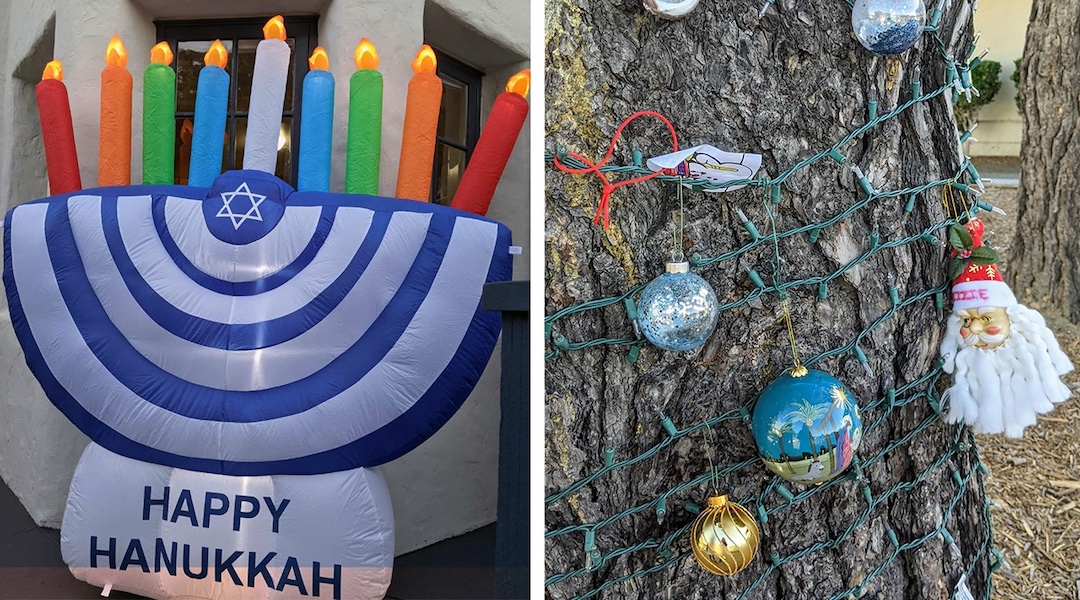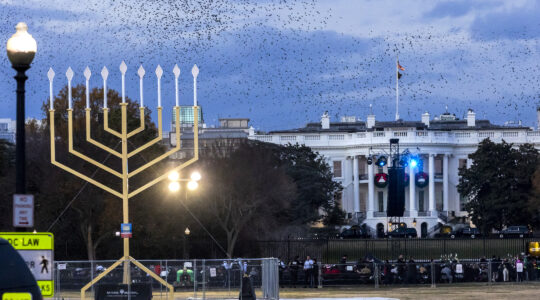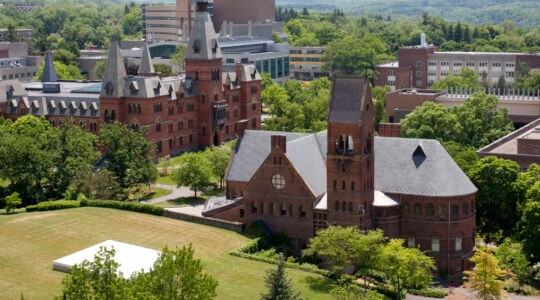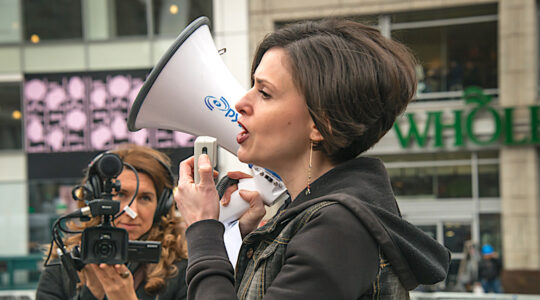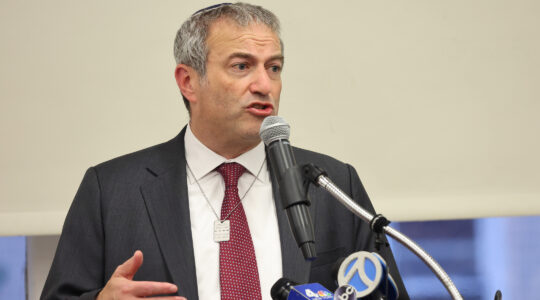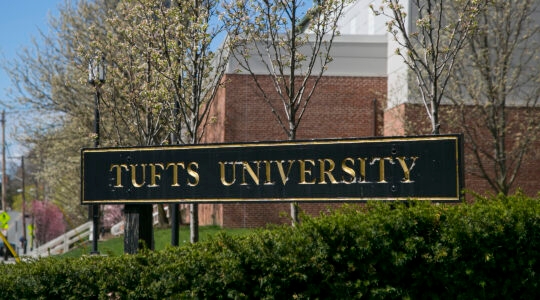(J. The Jewish News of Northern California via JTA) — For some time, Shel Lyons has scrutinized her children’s public elementary school for what she describes as a pattern of favoring Christianity over other religions.
This year, the Jewish parent found what she thought was clear evidence when an outdoor tree lighting was planned at the school, located in Carmel, California. She asked to bring a giant inflatable menorah to display alongside the tree, but the school’s administration and parent-teacher organization denied the request.
Three days before the planned Dec. 10 tree lighting, Lyons took them to court over it. An attorney, Lyons filed a lawsuit in the Northern District of California against the school district, Superintendent Ted Knight and Carmel River School Principal Jay Marden, seeking a temporary restraining order that would have required the school to allow the inflatable menorah.
Three days after that, Lyons — who has a third-grader at the K-5 school and is the parent of two of its graduates — voluntarily withdrew the suit, after a judge found she had not met the “high standard” required for the restraining order.
The dispute has raised decades-old questions about how to properly include students of different faiths at a public elementary school, and has also revived a national debate over what it means to show preference to a specific religion — which is unconstitutional by a public school, according to the Establishment Clause of the First Amendment.
Officials at the Carmel River School contend that the tree lighting was nonreligious in nature and intended only to celebrate the holiday season. But Lyons saw the Dec. 10 event as not a religion-neutral affair but a Christian one.
The allegations of “systemic endorsement of Christian beliefs” were “very serious,” and “the feelings of exclusion experienced by the minor children are particularly troubling,” Judge Beth Labson Freeman wrote in the ruling against a restraining order. But she did not rule on a larger question posed in Lyons’ lawsuit: whether the school had shown a pattern of favoring Christianity.
The Dec. 10 gathering was hosted by Carmel River School’s PTA, which required the permission of administrators to hold the event on school property. Though described as a tree lighting, the festivities also involved decorating the tree, planted on school grounds, with ornaments.
Lyons saw the event plainly as a Christmas tree ceremony and said that while Christmas-themed celebrations and symbols are everywhere at the school, symbols of other holidays, such as Hanukkah and Kwanzaa, are not.
The school does make attempts to include Hanukkah around the holidays. But when a Hanukkah song was sung at her child’s kindergarten holiday music show several years ago, Lyons said, it was introduced as an “Israeli” song, implying to her that the Christmas songs were simply “American” songs.
“I had to explain to them we are not Israeli, my daughter doesn’t speak Hebrew,” she said.
Prior to the tree lighting event, the PTA invited school families to bring an item to decorate the tree “that reflects their family, heritage, and/or faith.”
Lyons said she and her husband “were shocked by the ignorance and offensiveness of that suggestion.” They didn’t want to hang anything related to their family’s Judaism on a tree that’s a symbol of a Christian holiday.
Instead, she asked to bring a Hanukkah object — a 6-foot tall inflatable hanukkiah, or menorah — to display alongside the tree.
The PTA and the school refused, saying it did not meet the qualifications for an ornament: that the object be able to fit into a paper lunch bag.
“Large inflatables have never been used on the School campus as part of December holiday celebrations,” Marden wrote in a declaration filed with the court.
The school said it offered Lyons the opportunity to display her inflatable menorah elsewhere “when the use would not conflict with the scheduled event.” Lyons said the offer was made after Hanukkah had ended, but if it were made earlier she would have considered it.
To many Jews, the idea of decorating a tree in December with a Jewish object feels odd, if not unseemly. Rabbi Bruce Greenbaum of Carmel’s Reform synagogue, Congregation Beth Israel, said he would in general advise congregants against it.
Greenbaum sent his children to the Carmel River School and said he called to voice his displeasure when he heard about the recent controversy.
“Don’t turn your hanukkiah into a Christmas decoration,” he said. “That’s desecrating the hanukkiah.”
He didn’t buy the notion that the tree lighting ceremony was unrelated to Christmas, despite the tree being an existing one on school grounds.
“I told them there’s no such thing as a tree lighting, which is what they’re calling it,” he said. “You can call it a tree lighting, but it’s just a Christmas tree lighting.”
The Carmel Unified School District did not respond to a request for comment, citing ongoing litigation.
Legally, Lyons — who had asked the judge to declare the Carmel River School’s practices unconstitutional, and to order school administrators to change course — faced an uphill climb from the beginning. That’s according to Charles Russo, a law professor at the University of Dayton who specializes in education law and in 2014 coauthored a paper on legal issues surrounding the celebration of Christmas in public schools.
Russo pointed to the fact that, in the 1989 Supreme Court case County of Alleghany v. American Civil Liberties Union, in which the ACLU sued the Pittsburgh county over displays of a menorah, Christmas tree and nativity scene on city property, the court held that the Christmas tree “is not itself a religious symbol.”
“If the school officials did not have some explicit Christian symbol,” like a baby Jesus or a nativity scene, he said, “I don’t think [the lawsuit] is going to go too far.”
Lyons said she has not ruled out filing a new lawsuit. She also said she had looked into finding a new school for her third-grader, but the other elementary school in her district was full. She said ultimately she was dismayed by the school’s response to her complaints, whether administrators are legally protected or not.
If the law allows the school’s approach, “it doesn’t matter if it’s right or wrong,” she said. “It doesn’t matter if kids get hurt.”
A version of this article was originally published in J. The Jewish News of Northern California, and is reposted with permission.
JTA has documented Jewish history in real-time for over a century. Keep our journalism strong by joining us in supporting independent, award-winning reporting.
